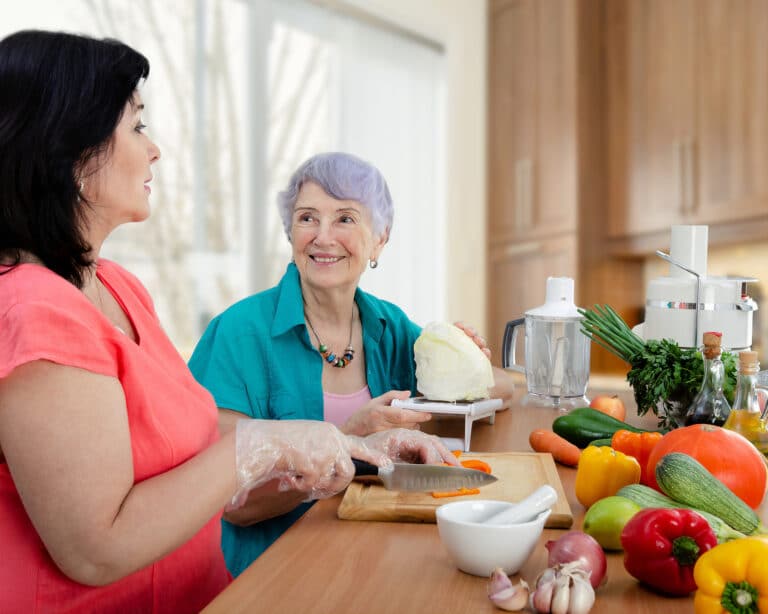When faced with a need to transition to pureed foods, seniors often encounter strong emotions and several challenges. As loved ones caring for the senior in question, you likely want to do all you can to make the transition easier. The good news is that there are ways to do this, using the tips below and support from home care providers. Continue reading to learn more.
What Reasons Require a Transition to Pureed Foods?
As we get older, some health problems can make it harder to chew and swallow food properly. For instance, dysphagia is a disease that affects a lot of older people and can make it hard to safely eat solid foods. This situation can happen after a stroke, a neurological disorder, or another health problem that affects the muscles used for swallowing.
Foods that have been pureed can help because they have a smooth texture that makes them easier to swallow without the risk of choking or reflux. By pureeing foods like fruits, veggies, meats, and grains, seniors who have trouble swallowing can still eat a healthy diet and stay healthy overall. However, it’s not just about pureeing foods; it’s also about making sure that the foods offer the right amount of nutrients for seniors’ needs, which is where home care can step in to help.
Ultimately, switching to pureed foods ensures seniors can still enjoy eating without risking their health.
What Challenges Arise When Transitioning to Pureed Foods?
For seniors, switching to pureed foods can be hard in a number of ways. One problem that many have is that their meals lose texture and variety, which can make eating less fun. Seniors may also find it hard to accept that they need to change their diet, especially when they have lived their whole lives eating solid foods.
As mentioned, concerns may also be raised about meeting nutritional needs when moving to pureed foods since making sure that these meals are well-balanced and full of nutrients is important for health in general.
Another problem for seniors who are switching to pureed foods is how it impacts their experience eating with friends and family. Eating has always been a social activity that brings people together, so getting used to eating pureed foods while other people eat normal meals can make them feel alone.
How Can Home Care Help?
It can be hard for seniors to switch to a pureed diet, but the process can go more smoothly with the right help and support. Helping adults get used to their new dietary needs is a big part of home care services. Home care providers can help and support them in many ways, such as making healthy, prepared meals and being there during meal times.
When seniors work closely with their loved ones and home care aides, they get personalized care that fits their specific dietary needs. Home care agencies can help seniors stay healthy and happy while they switch to pureed foods by being patient and understanding and helping seniors be creative with their diets.
If you or an aging loved one are considering Home Care in Columbia, SC, please contact the caring staff at Avodah Home Care. Call (877) 4-AVODAH
Avodah Home Care is a Trusted Home Care Agency serving Abbeville, Aiken, Anderson, Barnwell, Calhoun County, Chesterfield County, Darlington, Dillon, Edgefield, Batesburg-Leesville, Florence, Greenville, Greenwood, Columbia, Lexington, Camden, Blythewood, Winnsboro, Orangeburg, Sumter, Gaston, Hopkins, Bishopville and surrounding areas.
Sources:
- https://www.grayingwithgrace.com/make-pureed-food-elderly/
- https://www.healthline.com/nutrition/pureed-food
Our team includes registered nurses, licensed practical nurses, certified nursing assistants, home health aides, and other healthcare professionals, all of whom have years of experience in the home care industry. We work together to provide comprehensive care that encompasses both medical and non-medical services, helping our clients maintain their independence and live with dignity in their own homes.
With our decades of experience, we have developed a deep understanding of the home care industry and the best practices for providing high-quality care. We are dedicated to staying up-to-date on the latest advances in care delivery, and we are committed to providing our clients with the most effective, evidence-based care.
At our core, our team is driven by a deep commitment to our clients and their families. We know that home care can be a difficult and challenging journey, and we are here to provide the support, guidance, and care that our clients need to thrive. Our team members are not only experienced professionals, but also compassionate and caring individuals who are dedicated to making a difference in the lives of our clients.


